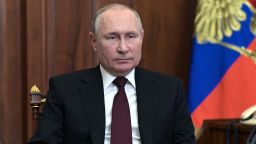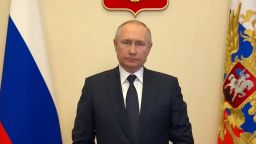Editor’s Note: Julian Zelizer, a CNN political analyst, is a professor of history and public affairs at Princeton University and author of the forthcoming book “The Presidency of Donald J. Trump: A First Historical Assessment.” Follow him on Twitter @julianzelizer. The views expressed in this commentary are his own. View more opinion on CNN.
As Russia wreaks havoc on Ukraine and international stability through its ruthless military campaign, it can be difficult to understand the impact Russia’s aggression is having on domestic politics here in the US.

In other moments – such as when Democrat Jimmy Carter was in the White House when the Soviets invaded Afghanistan in 1979 – Republicans have predictably scored points by attacking the President as “weak on defense.” But in 2022, the dynamics are different.
Even as polls shows that Russia is the one rare topic on which voters in both parties find themselves in agreement, Republican party leadership is having trouble taking a clear stand.
The problem is that the low-hanging fruit of condemning Russia and its president, Vladimir Putin, is not a unanimous position within the GOP. During his presidency, Donald Trump continually shocked the world with his refusal to publicly condemn Putin.
Most unsettling was the moment in Helsinki in July 2018, when Trump stood side-by-side with the autocratic leader and defended Russia from allegations that it had attempted to interfere in the 2016 election, despite the findings of US intelligence agencies. “President Putin says it’s not Russia,” Trump explained, “I don’t see any reason why it would be.”
Trump was more intent on delivering strong words about Democrats and the FBI than he was about the person standing beside him. Indeed, there were many times during his four years in office when Trump lavished praise on Putin, as he did for other autocrats who have threatened democracy.
And that was not all. Throughout his presidency, Trump repeatedly made disparaging remarks about the NATO alliance, which is now emerging as the critical firewall that will protect the rest of Europe from the ambitions of a brutal leader.
Though Trump’s first impeachment proceeding now feels like a mere blip in his chaotic presidency – especially after his second impeachment following the Capitol insurrection on January 6 – the issues raised in the hearings and trial are incredibly damning.
As Greg Sargent recounts for the Washington Post, Trump took steps that hurt Ukraine. He spread the conspiracy theory that it was Ukraine, not Russia, that interfered in the 2016 election. And he had the US Ambassador to Ukraine, Marie Yovanovitch, removed from her post despite her distinguished reputation.
This was a damaging decision as the nation’s new president, Volodymyr Zelensky, started his term and congressionally approved military aid to Ukraine was frozen at a critical moment.
Trump also withheld a meeting with Zelensky, with word sent a meeting depended on his assistance digging up dirt on the US president’s future election opponent Joe Biden. Finally, Trump empowered Rudy Giuliani, his former attorney and New York City mayor, to be a prime mover on this area of policy. As former National Security Council Official Fiona Hill testified to the House Intelligence Committee, the president had a team conducting its own shadow diplomacy, trying to connect Ukraine to Trump’s own reelection needs.
Trump’s record on Russia is bigger than himself. It’s a party problem. It is important to remember in the first impeachment trial, nearly every House and Senate Republican stood firmly behind the president. “We will reject this incoherent case that comes nowhere near justifying the first presidential removal in history,” then-Senate Majority Leader Mitch McConnell proclaimed.
South Carolina Sen. Lindsey Graham called the impeachment a “sham process.” Only Utah’s Mitt Romney voted in favor of convicting on one article of impeachment, calling Trump’s actions “the most abusive and destructive violation of one’s oath of office that I can imagine.”
There was no mystery as to what Trump’s position was on Russia. Even as he maintained sanctions, his actions played a major role in giving Putin legitimacy and respect on the world stage because of his rhetoric as well as his actions toward Ukraine. While many Republicans might have been unhappy with this turn of foreign policy, he still had a strong base that supported him for reelection in 2020. That is the single measure that really counts. The bottom line is the fiercest of Republican Russian hawks are likely among those who stood by him going into the 2020 election.
Now, more Republicans are being open about the costs of Trump’s actions in Russia to the world and to the party. Recently, former Republican representative from Pennsylvania and CNN political commentator Charlie Dent urged his party to shift course and embrace the “traditional” Republican foreign policy strategy of muscular internationalism.
“America First and MAGA Republicans insist upon the inward-looking path of Trumpism that is defined by isolationism, protectionism, nativism, unilateralism and – at times – nihilism,” Dent wrote. “The traditionalists view Russia as a strategic adversary intent on undermining American power and influence throughout the world. Russia, along with the autocratic regimes in Iran, North Korea, Cuba, Venezuela and, to a lesser extent, China, want to disrupt Pax Americana.”
The problem is the GOP can’t simply erase what happened during the four years of Trump’s presidency or forget when Trump called Putin’s actions in Ukraine “genius.”
Other GOP figures seem to be following Trump’s dangerous lead. US Rep. Marjorie Taylor Greene appeared at a white nationalist event a few days ago where the crowd cheered for Putin and the invasion. (Greene later tried to distance herself from the organizer, who praised Putin for his invasion of Ukraine, saying, “I do not know Nick Fuentes. I do not know what his views are so I am not aligned with anything that is controversial.”)
Some Republicans are pushing back against Trump, to some extent, after having been unwavering foot soldiers during his presidency. Former Vice President Mike Pence, for one, is expected to condemn Republican “apologists” who have complimented Putin, according to excerpts of a speech to top GOP donors obtained by CNN.
Graham also staked out a different position from Trump, saying, “I think that was a mistake. I think I know what he was trying to say, you know, going into the Donbas. But, no. Let’s just make it clear, Putin’s not a genius. He’s a war criminal.”
Despite these comments, Republicans won’t be able to easily recreate what Dent calls the “traditional” Republican view given that their party is still saddled with the legacy of Trump.
Trumpism is Republicanism. He remains the titular head of the party and possibly the candidate for 2024. At this moment, Biden, along with his party, continue to be the leaders behind a firm, aggressive and international sanction-based response to the dangerous situation unfolding in Eastern Europe. Republicans can’t invoke “weak on defense” attacks this time around because it is the GOP that has shattered a bipartisan consensus against the tyrant currently causing carnage and even raising the specter of nuclear war.




